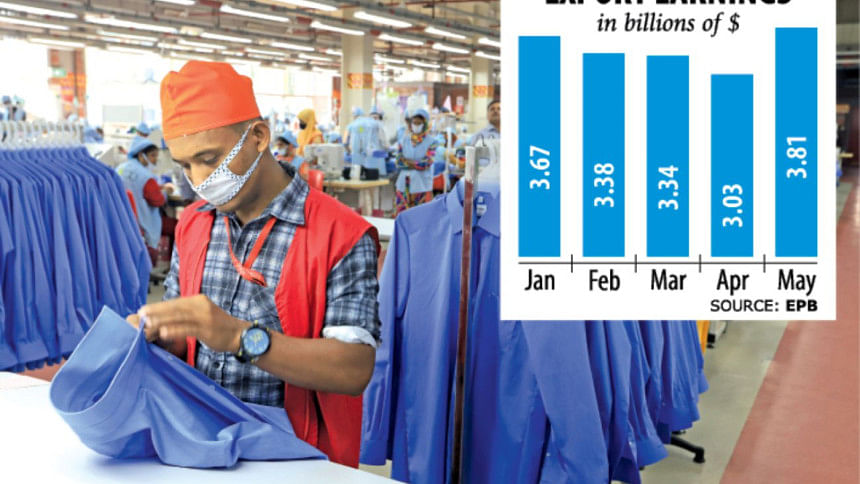Highest ever export earnings in May

Bangladesh raked in $3.81 billion in exports in May, the highest single month receipts in history, riding on the higher shipment of apparels, official data showed yesterday.
The earnings clocked 14.78 percent year-on-year growth in May and also beat the monthly target by 9.23 percent.
The previous single month highest export was recorded at $3.67 billion in January this year.
The apparel shipment took the overall export earnings to $37.76 billion between July and May, up 11.92 percent year-on-year, according to data from the Export Promotion Bureau.
Between July and May, the export of garment, which makes up more than 80 percent in the total exports earnings, grew 12.82 percent year-on-year to $31.73 billion. Some $15.69 billion came from knitwear export and $16.06 billion from woven export.
The garment export was 6.95 percent higher than the 11-month target of $29.67 billion set by the government.
“We are receiving a lot of work orders from US retailers and brands for the ongoing trade war between the US and China. This is one of the major reasons for the higher shipment of garment items,” said Asif Ibrahim, a director of the Bangladesh Garment Manufacturers and Exporters Association. He says US retailers and brands are flocking to Bangladesh because they want hassle-free shipment and do not want any uncertainty.
According to the entrepreneur, work orders are also shifting from China and other countries to Bangladesh as the sector in the world’s second largest economy faces higher cost of production, uncertainty and a lack of skilled workers. The massive transformation in the Bangladesh’s garment sector since the collapse of the Rana Plaza has also made the country an attractive destination to place orders.
The buyers’ confidence in the country has improved significantly owing to the inspection and remediation of garment factories by the Accord and the Alliance, the two western brands’ platforms set up to improve the workplace safety in the sector.
“I am cautiously optimistic that the export of garment will continue to grow from Bangladesh,” Ibrahim said.
The businessman, however says, manufacturers are not getting better prices from the retailers and brands.
Apart from apparel, some other sectors also fared well.
The shipment of frozen and live fish such as shrimp and crabs rose 1.87 percent to $474.02 million and that of agricultural products such as tea, vegetables, fruits, spices, dry food, and tobacco surged 40.3 percent to $854.46 million. Pharmaceuticals, cement, salt and ores, petroleum byproducts, plastic goods, ceramics, handicrafts, cotton, cotton products (yarn and wastes of fabrics), carpet, terry towel, footwear, wigs, and furniture performed better in the 11-month period.
However, leather and leather goods and jute and jute goods continued their poor show. Leather and leather goods fetched $943.83 million, down 5.53 percent year-on-year.
This is largely because many tanneries that have shifted to the leather estate in Savar have not started full production yet.
The sector is the only segment that had crossed the $1-billion export mark after the garment sector and it still has the opportunity to repeat the success at the end of the fiscal year. Exports of jute and jute goods, another important foreign currency earner, fell 19.99 percent year-on-year to $773.57 million.
The sector’s earnings are declining mainly because of higher use of jute goods like sacks in the domestic market and the anti-dumping duty slapped on it by India.
Home textiles, building materials, ships and bicycles also performed poorly.

 For all latest news, follow The Daily Star's Google News channel.
For all latest news, follow The Daily Star's Google News channel. 




Comments